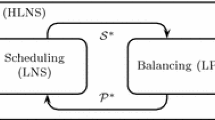Abstract
The pre-planned schedules of a transportation company are often disrupted by unforeseen events. As a result of a disruption, a new schedule has to be produced as soon as possible. This process is called the vehicle rescheduling problem, which aims to solve a single disruption and restore the order of transportation. However, there are multiple disruptions happening over a “planning unit” (usually a day), and all of them have to be addressed to achieve a final feasible schedule. From an operations management point of view the quality of the final solution has to be measured by the combined quality of every change over the horizon of the “planning unit”, not by evaluating the solution of each disruption as a separate problem. The problem of finding an optimal solution where all disruptions of a “planning unit” are addressed will be introduced as the dynamic vehicle rescheduling problem (DVRSP). The disruptions of the DVRSP arrive in an online manner, but giving an optimal final schedule for the “planning unit” would mean knowing all information in advance. This is not possible in a real-life scenario, which means that heuristic solution methods have to be considered. In this paper, we present a recursive and a local search algorithm to solve the DVRSP. In order to measure the quality of the solutions given by the heuristics, we introduce the so-called quasi-static DVRSP, a theoretical problem where all the disruptions are known in advance. We give two mathematical models for this quasi-static problem, and use their optimal solutions to evaluate the quality of our heuristic results. The heuristic methods for the dynamic problem are tested on different random instances.




Similar content being viewed by others
References
Balogh J, Dávid B (2014) An algorithmic framework for real-time rescheduling in public bus transportation. In: Proceedings of the 2013 mini-conference on applied theoretical computer science (MATCOS), pp 29–33
Bertossi A, Carraresi P, Gallo G (1987) On some matching problems arising in vehicle scheduling models. Networks 17(1):271–281
Bodin L, Golden B (1981) Classification in vehicle routing and scheduling. Networks 11(1):97–108
Bodin L, Golden B, Assad A, Ball M (1983) Routing and scheduling of vehicles and crews: the state of the art. Comput Oper Res 10(1):63–212
Bunte S, Kliewer N (2009) An overview on vehicle scheduling models. J Public Transp 1(4):299–317
Clausen J, Larsen A, Larsen J, Rezanova NJ (2010) Disruption management in the airline industry-concepts, models and methods. Comput Oper Res 37(5):809–821
Clausen J, Larsen A, Larsen J (2005) Disruption management in the airline industry—concepts, models and methods. Tech. rep., informatics and mathematical modelling, Technical University of Denmark, DTU
Dávid B, Krész M (2013) Application oriented variable fixing methods for the multiple depot vehicle scheduling problem. Acta Cybern 21(1):53–73
Dávid B, Krész M (2014) A model and fast heuristics for the multiple depot bus rescheduling problem. In: 10th international conference on the practice and theory of automated timetabling (PATAT), pp 128–141
Desrochers M, Lenstra J, Savelsbergh M, Soumis F (1988) Vehicle routing with time windows: optimization and approximation. Veh Routing Methods Stud 16:65–84
Huisman D, Freling R, Wagelmans AP (2004) A robust solution approach to the dynamic vehicle scheduling problem. Transp Sci 38(4):447–458
Huisman D, Wagelmans AP (2006) A solution approach for dynamic vehicle and crew scheduling. Eur J Oper Res 172(2):453–471
Jespersen-Groth J, Potthoff D, Clausen J, Huisman D, Kroon LG, Maróti G, Nielsen MN (2007) Disruption management in passenger railway transportation. Tech. rep., Erasmus University Rotterdam
Kliewer N, Mellouli T, Suhl L (2006) A time-space network based exact optimization model for multi-depot bus scheduling. Eur J Oper Res 175(3):1616–1627
Lettovsky L (1997) Airline operations recovery: an optimization approach. Ph.D. thesis
Li JQ, Borenstein D, Mirchandani PB (2007) A decision support system for the single-depot vehicle rescheduling problem. Comput Oper Res 34(4):1008–1032
Li JQ, Mirchandani PB, Borenstein D (2007) The vehicle rescheduling problem: model and algorithms. Networks 50(3):211–229
Li JQ, Mirchandani PB, Borenstein D (2009) A lagrangian heuristic for the real-time vehicle rescheduling problem. Transp Res Part E Logis Transp Rev 45(3):419–433
Löbel A (1997) Optimal vehicle scheduling in public transit. Ph.D. thesis
Pillac V, Gendreau M, Guéret C, Medaglia AL (2013) A review of dynamic vehicle routing problems. Eur J Oper Res 225(1):1–11
Psaraftis H (1988) Dynamic vehicle routing problems. Veh Routing Methods Stud 16:223–248
Psaraftis HN (1995) Dynamic vehicle routing: status and prospects. Ann Oper Res 61(1):143–164
Teodorovic D, Stojkovic G (1995) Model to reduce airline schedule disturbances. J Transp Eng 121(4):324–331
Acknowledgements
This research was partionally supported by National Research, Development and Innovation Office - NKFIH Fund No. SNN-117879.
Author information
Authors and Affiliations
Corresponding author
Rights and permissions
About this article
Cite this article
Dávid, B., Krész, M. The dynamic vehicle rescheduling problem. Cent Eur J Oper Res 25, 809–830 (2017). https://doi.org/10.1007/s10100-017-0478-7
Published:
Issue Date:
DOI: https://doi.org/10.1007/s10100-017-0478-7




